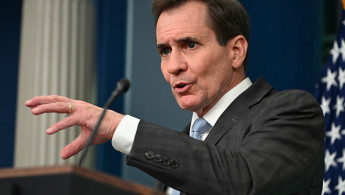White House's Kirby says US would defend Israel in Iranian retaliation
The United States remains committed to defending Israel in any Iranian retaliation, and was hopeful about a possible Gaza ceasefire agreement, White House national security spokesperson John Kirby said on Tuesday.
Kirby told Israel's Channel 12 that it was tough to predict the chances of an attack but the White House takes Iranian statements seriously.
"We believe that they are still postured and poised to launch an attack should they want to do that, which is why we have that enhanced force posture in the region," he said.
"Our messaging to Iran is consistent, has been and will stay consistent. One, don't do it. There's no reason to escalate this. There's no reason to potentially start some sort of all-out regional war. And number two, we are going to be prepared to defend Israel if it comes to that."
Iran has vowed a severe response to the killing of Hamas leader Ismail Haniyeh, which took place as he visited Tehran late last month and which it blamed on Israel. Israel has neither confirmed or denied its involvement.
The U.S. maintains two aircraft-carrier strike groups in the Middle East, as well as an extra squadron of F-22 fighter jets.
Kirby said the force will remain "as long as we feel like we need to keep it in place to help defend Israel and defend our own troops and facilities in the region."
He remained upbeat over a possible Gaza ceasefire deal to end the 10-month-old war and return the remaining 108 Israeli hostages, saying the process as been "constructive" and he was looking forward to more talks in Doha in the coming days.
Kirby declined to blame either side for the impasse, saying a deal will require compromise and leadership by Israel and Hamas.
"The parties are still engaged and that's a good thing," he said. "The fact that we've moved on to another level here with working groups now in Doha, that's not a bad thing. It means that the sides are still talking. It means that there's still hope that we can nail down these last few details and move forward."
"Hamas is still being represented in these working-group discussions and that is a good thing. Nobody has broken off entirely from the process."
(Reuters)





 Follow the Middle East's top stories in English at The New Arab on Google News
Follow the Middle East's top stories in English at The New Arab on Google News


